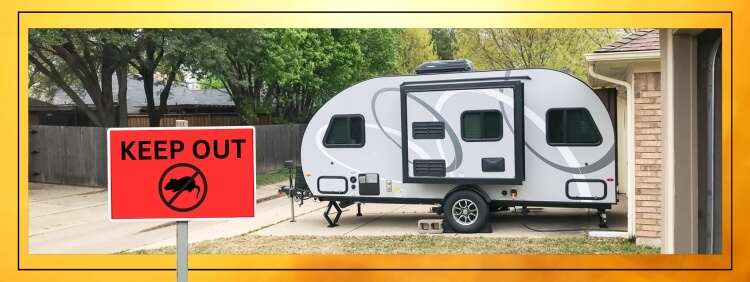 As you're enjoying the beautiful outdoors in Ontario, you might find a surprise visitor in your RV. Those little footsteps you hear at night? Yep, it's not part of the nature soundtrack—it's a classic camper issue. Mice may not stick around for long, but they can leave quite a lasting impression on your mobile getaway.
Enter the unsung heroes of tranquillity: Truly Nolen's pest control services. With expert services for rodent control in Haldimand-Norfolk, our professionals employ strategic measures to keep your wandering home-on-wheels a mice-free zone. Armed with the knowledge of what pest control does for mice, they implement proactive defences that ensure the only memories you'll bring back from your adventures are the ones you cherish—not the scurrying of unwelcome guests.
As you're enjoying the beautiful outdoors in Ontario, you might find a surprise visitor in your RV. Those little footsteps you hear at night? Yep, it's not part of the nature soundtrack—it's a classic camper issue. Mice may not stick around for long, but they can leave quite a lasting impression on your mobile getaway.
Enter the unsung heroes of tranquillity: Truly Nolen's pest control services. With expert services for rodent control in Haldimand-Norfolk, our professionals employ strategic measures to keep your wandering home-on-wheels a mice-free zone. Armed with the knowledge of what pest control does for mice, they implement proactive defences that ensure the only memories you'll bring back from your adventures are the ones you cherish—not the scurrying of unwelcome guests.
Understanding the Mice Menace in Campers and RVs
Recreational vehicles (RVs) and campers can unwittingly become a haven for mice due to their potential to provide warmth, comfort and a substantial food source. Given these favourable conditions and the forestry settings where these vehicles are often parked, mice are invariably attracted to them. While their innate cuteness might make their presence seem harmless, they cause a gamut of complications including damaging vehicle interiors, electrical wiring and even posing health risks due to the potential spread of diseases such as Hantavirus and Salmonella. Therefore, it's crucial for every RV owner to appropriately deal with this troubling issue.Identifying Signs of Mice Infestation in Your RV or Camper
Spotting a mouse in your vehicle can be quite alarming, but what's even more concerning is suspecting an infestation and not knowing for sure. It is indeed crucial that you are familiar with the typical signs of mice presence to prevent significant damage to your RV or camper. Mice are not exactly master hiders. Proof of their activities is often left behind for keen eyes to discover. A few key signs to watch out for when considering a possible infestation are:- Fecal droppings: Mice leave small, dark droppings that are around 3-6mm long. These are usually scattered near their nests or feeding areas.
- Strong unpleasant odour: A strong, musty smell, similar to the odour of ammonia, can also be a sign of a mouse infestation. This is their urine producing the smell - a clear giveaway of their presence.
- Nests: They typically make nests from shredded paper, fabric, or insulation, preferring hidden areas that are warm and near food sources.
- Nibble marks: If you notice small bite marks on food boxes, wires, or building materials, you might be dealing with mice.
- Noises: Sounds such as scratching, squeaking or rustling, particularly during the night when mice are most active, maybe a clear signal that you have a mouse problem.
Preventive Measures: Setting Up Your RV or Camper to Deter Mice
When it comes to deterring mice, your first line of defence is to make your RV or camper as inhospitable as possible. This involves a combination of proper cleaning practices, mindful storage, maintenance, and the use of rodent repellents. Start with a thorough cleanup. Mice are attracted to food scraps and trash, so it's essential to clean up after every meal and take the garbage out regularly. Vacuum the interiors, wipe down counters and tables, and ensure all your food items are stored in rodent-proof containers. Next, address potential entry points. Mice can squeeze through gaps as small as a pencil's diameter. Inspect your RV or camper for any cracks, holes, or gaps, particularly in the lower parts of the vehicle. Seal up these vulnerabilities using silicone caulk or steel wool, both of which are resistant to gnawing. Maintenance is vital. Regular checks and timely repairs of vulnerable areas such as ventilation screens, door gaps, and window seals could save you from a potential infestation. It is also a good idea to keep the area around your vehicle clear of debris, as this can serve as a hideout for mice. When it comes to repellents, there's a myriad of natural and commercial options available. Peppermint oil, for instance, is known to be a natural deterrent. Soak cotton balls in it and place them strategically around your camper. On the other hand, commercial solutions, such as ultrasonic repellents and rodent deterrent sprays, also offer a robust line of defence. A proactive approach is your best bet toward keeping your RV or camper mice-free. With conscientious habits and regular maintenance, you can enjoy your outdoor adventures without worrying about unwelcome rodent guests. Remember, if you do end up facing an infestation, professional pest management services like those offered by Truly Nolen Canada are ready to swiftly and effectively handle the problem for you.Choose Truly Nolen for Rodent Control in Haldimand-Norfolk
 When dealing with rodent issues in your RV or camper, choosing the right professionals can make all the difference. Undeniably, Truly Nolen Canada provides the best services in Haldimand-Norfolk handling rodent control effortlessly.
A significant factor that sets Truly Nolen Canada apart is our experience. Equipped with over 80 years of experience in the pest control industry, our expertise is unrivalled. We understand the unique challenges that both homeowners and RV or camper owners face when it comes to rodents. Taking this into consideration, we tailor specific solutions to each circumstance.
Secondly, our pest professionals employ proactive and innovative approaches to rodent control. We don't just treat the existing infestation but also focus on preventing future ones. Our treatments are not one-size-fits-all. We understand that every situation is unique, hence we customize each intervention to guarantee effectiveness.
Another component of our exemplary service is ensuring that we don't disrupt your life more than the rodents already have. We prioritize making our treatments as non-intrusive as possible. You can feel confident that you and your RV or camper will be treated with the utmost respect.
Furthermore, our environmentally friendly treatments at Truly Nolen Canada deserve a mention. We are committed to reducing our impact on the environment. This entails the careful selection of products we employ in rodent control and strict adherence to the recommended safety protocols.
Beyond the treatment, we also provide excellent customer service. Our team is attentive, responsive and always ready to listen to your concerns. This customer-centric approach has earned us the loyalty and trust of many customers over the years.
When it comes to choosing the best rodent control service in Haldimand-Norfolk, Truly Nolen Canada undoubtedly tops the list. Our expertise, commitment to customer satisfaction, customized treatments, proactive approach and respect for the environment all come together to ensure you get the best possible service. Your peace of mind is our priority.
Don't let your camping experience be marred by an unexpected rodent invasion. If you are struggling with a mouse problem in your RV or camper, just give Truly Nolen Canada a call. It's time to put an end to the disruption and worry.
Trust our experts to tackle your rodent issue promptly and effectively. Act now and contact our team for your rodent control solutions in Haldimand-Norfolk.
Your peaceful camping adventure awaits!
When dealing with rodent issues in your RV or camper, choosing the right professionals can make all the difference. Undeniably, Truly Nolen Canada provides the best services in Haldimand-Norfolk handling rodent control effortlessly.
A significant factor that sets Truly Nolen Canada apart is our experience. Equipped with over 80 years of experience in the pest control industry, our expertise is unrivalled. We understand the unique challenges that both homeowners and RV or camper owners face when it comes to rodents. Taking this into consideration, we tailor specific solutions to each circumstance.
Secondly, our pest professionals employ proactive and innovative approaches to rodent control. We don't just treat the existing infestation but also focus on preventing future ones. Our treatments are not one-size-fits-all. We understand that every situation is unique, hence we customize each intervention to guarantee effectiveness.
Another component of our exemplary service is ensuring that we don't disrupt your life more than the rodents already have. We prioritize making our treatments as non-intrusive as possible. You can feel confident that you and your RV or camper will be treated with the utmost respect.
Furthermore, our environmentally friendly treatments at Truly Nolen Canada deserve a mention. We are committed to reducing our impact on the environment. This entails the careful selection of products we employ in rodent control and strict adherence to the recommended safety protocols.
Beyond the treatment, we also provide excellent customer service. Our team is attentive, responsive and always ready to listen to your concerns. This customer-centric approach has earned us the loyalty and trust of many customers over the years.
When it comes to choosing the best rodent control service in Haldimand-Norfolk, Truly Nolen Canada undoubtedly tops the list. Our expertise, commitment to customer satisfaction, customized treatments, proactive approach and respect for the environment all come together to ensure you get the best possible service. Your peace of mind is our priority.
Don't let your camping experience be marred by an unexpected rodent invasion. If you are struggling with a mouse problem in your RV or camper, just give Truly Nolen Canada a call. It's time to put an end to the disruption and worry.
Trust our experts to tackle your rodent issue promptly and effectively. Act now and contact our team for your rodent control solutions in Haldimand-Norfolk.
Your peaceful camping adventure awaits! 
